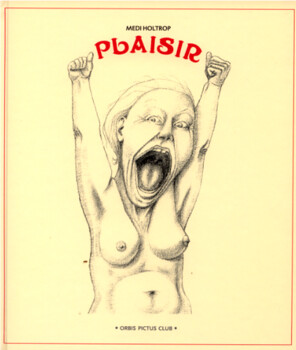Plaisir (2008) – Medi Holtrop
In France, Norwegian artist Medi Holtrop and lifelong companion of Bernard Willem Holtrop received the 2009 Grandville grand prize of “l’humour noir.”
Via L’Alamblog[1]
I’ve previously written on the notion of humour noir, which translates into English as black comedy defined as a sub-genre of comedy and satire where topics and events that are usually treated seriously — death, mass murder, suicide, sickness, madness, terror, drug abuse, rape, war, etc. — are treated in a humorous or satirical manner. Synonyms include dark humor, morbid humor, gallows humor and off-color humor.
The French were the first to anthologize the genre in the seminal anthology Anthology of Black Humor (1940) by André Breton. Breton’s anthology not only introduced some until then almost unknown or forgotten writers, it also coined the term “black humor” (as Breton said, until then the term had meant nothing, unless someone imagined jokes about black people ). The term became globally used since then. The choice of authors was done entirely by Breton and according to his taste which he explains in the Foreword (called The Lightning Rod, a term suggested by Lichtenberg), a work of great depth that starts with contemplating Rimbaud´s words “Emanations, explosions.” from Rimbaud´s last poem The barrack-room of night : Dream.
In the United States, black comedy as a literary genre came to prominence in the 1950s and 1960s. Writers such as Terry Southern, Joseph Heller, Thomas Pynchon, Kurt Vonnegut and Harlan Ellison have published novels, stories and plays where profound or horrific events were portrayed in a comic manner. An anthology edited by Bruce Jay Friedman, titled Black Humor: Anthology was published in 1965.
I am currently researching the prevalence of black comedy in other parts of Europe.

